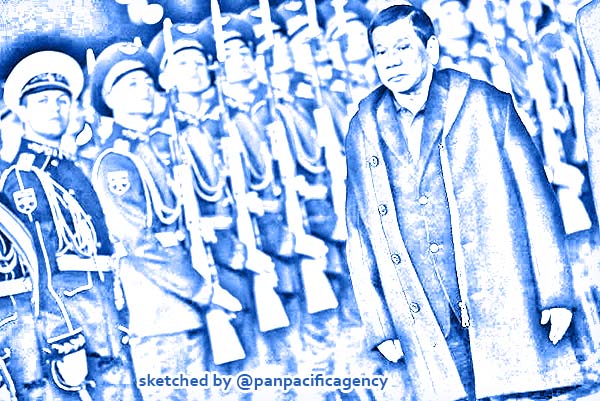[Analytics] Duterte better call Trump on visa ban

The President has previously pointed out that it is much cheaper if he uses a private jet than charter a bigger aircraft for his foreign travels. Photo by The PhilStar. Sketched by the Pan Pacific Agency.
Abusive Philippine officials in panic over the US Magnitsky law that could ban them from the United States and freeze their assets there could ask President Duterte to call his friend President Trump to go easy on them. Federico D. Pascual Jr. specially for The Philippine Star.
That seems to be the most practical way out of their having been trapped by their involvement in corruption and human rights violations and/or their ganging up on Sen. Leila de Lima, who has been imprisoned and prevented from performing her duties as legislator.
The Global Magnitsky Human Rights Accountability Act allowing the US to impose sanctions on foreign officials implicated in human rights abuses is to be enforced by the Executive department, not the US Senate where an amendment on De Lima was approved recently.
If Trump is indeed a good friend of Duterte, as the latter claims, the mayor could perhaps try picking up the phone and asking him for more time to sort out De Lima and related issues.
But it does not look good that while Malacañang keeps secret the text of its alleged diplomatic protests against China’s unfriendly and aggressive acts in the Philippines’ exclusive economic zone, it broadcasts its objections to the US Magnitsky law.
We doubt if the lawyerly remarks of Duterte’s spokesman Salvador Panelo or the press releases of the Philippine embassy in Washington, DC, could prevent the denial of visas to abusive Philippine officials and stop the freezing of their assets in the US.
Panelo said: “We are not bothered by it (the ban/freeze). It’s their process. We cannot intrude, in the same way that we react when they intrude into our processes. The very provision says there must be credible information before they ban any official in the Philippines.
“But I notice in that provision that has been approved there is such a colatilla… When the US Secretary of State receives ‘credible information’ in the so-called wrongful imprisonment. In the first place, it’s not a wrongful imprisonment, as we have repeatedly explained.
“There must be a credible information. If the information is not credible, then the US Secretary of State will not impose such sanction. That’s precisely what I am saying, there is none.”
We agree that the Americans’ applying pressure on the De Lima case is meddling, but it does not alter the fact that the US has the sovereign prerogative to ban aliens it deems undesirable or freeze their bank accounts and assets in the US for valid reasons.
In fact, on the level of a US consular officer in Manila, a Filipino’s visa application can be denied outright without the consul’s going into a long explanation for his action, unless the denial is raised to higher authority.
Even when a Filipino already holds a US visitor’s visa, that is no guarantee of hassle-free entry. The immigration or border officer at the port of entry can still bar him without a detailed justification, although the intending visitor has options for an appeal.
The basic fact is that it is their country and they open/close the door as they please.
As regards bank accounts, real property and other assets of Filipino officials – including many senators and congressmen – these have long been documented. The US government has access to all that information.
Once an individual fills out a form in the US, he can stop whining about invasion of privacy. His precious private domain has been invaded – sometimes for good reason, as in the Magnitsky law that provides another layer of protection for victims of oppressive foreign officials.
So, as we said, instead of venting spleen over the travel ban and the asset freeze, our suggestion is to work on the problem quietly. Duterte’s cohorts can ask him to plead with Trump to go easy on them – kung totoong kaibigan nga niya at kaya niya.
There is another option. If administration officials are blacklisted in the US, they can travel instead to China, hide their wealth there, and learn Mandarin while waiting for the Philippines to become a province of China under Duterte.
But they should do so quickly before their assets in the US are locked in. Their space in the democratic world is getting smaller, as pointed out in our Postscript of Dec. 19: https://tinyurl.com/wbwug6n
After the US Senate unanimously passed on Dec. 11 a bipartisan resolution banning the entry of persons behind EJK/HR violations and freezing their Stateside assets, the European Parliament moved closer to adopting a European “Magnitsky Act” modeled after the US law.
Other like-minded countries, such as the United Kingdom and Canada, have passed legislation along the same restrictive line but applicable only to Russian human rights violators. The coverage could be widened to include Asia and other areas.
Btw, Duterte, who is again suddenly talking peace with Filipino communist rebels, better be careful about describing them as terrorists. The US government also freezes bank accounts and other assets of persons and groups categorized as terrorists.
US Senate Resolution No. 142 whose provisions had been worked into the Magnitsky law called on President Trump to impose sanctions on Philippine officials and security forces behind extrajudicial killings.
The ban on officials involved in the imprisonment of De Lima is based on an amendment in the $1.4-trillion 2020 US budget signed Friday by Trump. It is in the State and Foreign Operations Appropriations section put in by Sens. Richard Durbin and Patrick Leahy.
A section titled “Prohibition on Entry” says that the Secretary of State “shall apply sub-section (c) to foreign government officials about whom the Secretary has credible information have been involved in the wrongful imprisonment of… Sen. Leila de Lima who was arrested in the Philippines in 2017.”